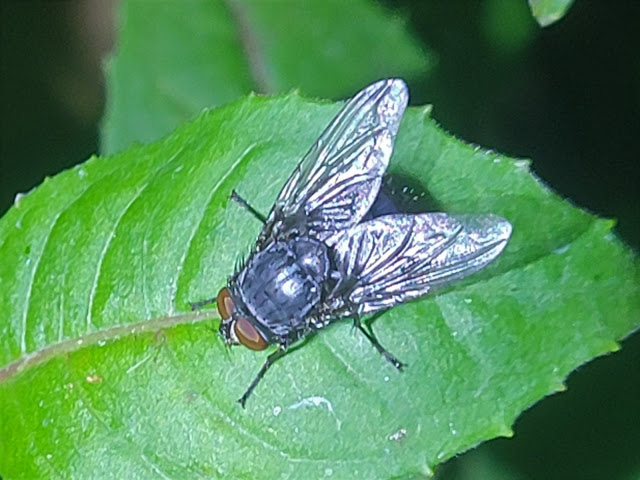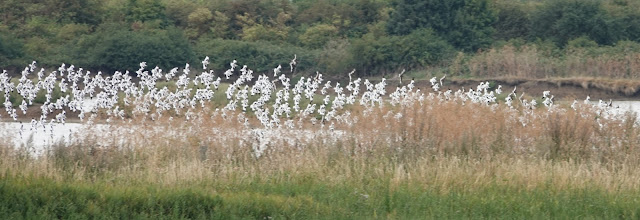A quiet weekend around home with some garden tinkering in a more autumnal vein than mid-summer with the removal already of my desiccated Raspberry Canes that just gave up the ghost during the intense heat. I have just about manged to keep this year’s new growth alive but the ground is parched despite being in the shade for a good part of any day. Even the Ferns have struggled and the Fuchsias were dropping buds before they opened. Only the Blackberries have done well and the first pot collected found their way into a beautiful romance with some apples and crumble…
The only plant that had valiantly struggled on are the
couple of itinerant Ragwort that tenaciously got going in the shingle with the
Teasels. They have, as already posted,
provided my garden with a focal point in these dry times but I had also seen a
post about their importance at night time to nectaring moths, flies and bugs
and so I ventured up the garden with my torch.
Sure enough there were quite a few insects in attendance
with a couple each of Mother of Pearl and Box Moth and three Beautiful Plume.
 |
| Beautiful Plume - Amblyptilia acanthadactyla. |
A couple of white Misumena vatia and Enoplognatha were
laying in wait and Araneus diadematus were strung across every gap. There were a few small flies and by scanning
around I found quite a few Calliphora vicina ‘roosting’ on leaves where they
seem unaffected by my torchlight. I
even managed to find roosting White butterflies under leaves in the Hazel hedge.
 |
| Misumena vatia |
 |
| Calliphora vicina |
 |
| Calliphora vicina |
Back down near the house the spiders changed and became wall
dwellers and nook occupiers and I found some of the largest Steatoda nobilis I
have ever seen hanging in wait in their scrappy webs while Pholcus phalangioides
loitered nearby for a poaching opportunity.
 |
| Steatoda nobilis |
 |
| Pholcus phalangioides |
 |
| And not sure what this one is yet |
As I had hoped there were a couple of Segestria florentina with
their hairy legs strategically poised outside their holes feeling those trip
wires for movement and with green chelicera gleaming. These ladies always have a proper Shelob feel
to them. I only had my phone but may try
for some better shots later this evening.
This morning I actually managed to drag myself over to Cliffe
for a couple of hours which was pleasantly spent on the Black Barn viewing
mound with a nice chap from Dartford called Martin.
It was grey but warm and flat calm and the visibility was
great onto the pools. Between there and the Radar Pool I counted 23 Greenshank,
three Common Sandpipers, three Green Sandpipers, 30 Redshank, nine Little
Ringed Plovers, two black bellied Dunlin and a very smart almost full sum plum
Curlew Sandpiper.
A few Black-tailed Godwits and young fledged Avocets were on
BB1 and a male Peregrine spooked the vast flock of Avocets that were lurking
unseen on the main pit beyond.
 |
| Avocets |
 |
| Peregrine |
The Glossy Ibis was on show for most of the time and came in
quite close at one stage and even reappeared for a couple out picking
Blackberries who asked what we were watching. The head was already streaky but
through the scope the bird was still cast with sheens of purple of petrol green
as it probed the shallows. Sixteen Little
Egrets were present when I arrived but soon dispersed and Water Rails were
constantly squealing and kipping from the reeds with two adults feeding together
unperturbed on the closest muddy fringe.
 |
| Glossy Ibis, Greenshank and Redshank |
Swifts were steadily heading east and a few Swallows and
House Martins drifted over but where are the vast Sand Martin flocks of my
youth? There were young Tufted Ducks and Pochard on BB1 with eclipse Mallard, Teal and Shoveler and Little Grebes were liberally dotted about as usual.
Lesser Whitethroats squelchy tacked from the Hawthorns and
there were still active Reed and Sedge Warblers visibly moving back and forth
with food morsels.
A single female Marsh Harrier and couple of Buzzards past over and two pairs
of Ravens headed north towards the Thames; their kronking and popping being
audible from a great distance.
There was only some Perennial Wall Rocket flowering on the
ramp but it did have Shrill Carder Bees in attendance along with Eristalis
tenax and a couple of Eupeodes and Sphaerophoria and Gatekeepers were the most
obvious butterfly.
I bid my farewells and bumped back out stopping for a male
Blue Eyed Hawker and three Wall Browns on the way.







No comments:
Post a Comment